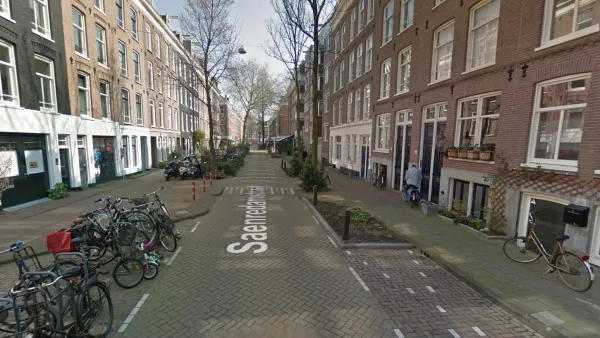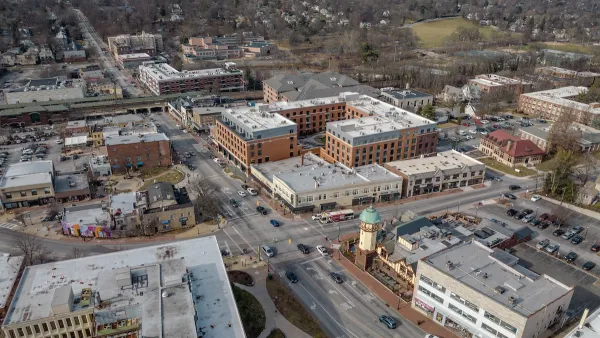While critiquing one of my blog posts, Prof. Randall Crane asked: "Is any parking regulation a net social burden or only 1.75 spaces per Jacksonville, Florida apartment?" This question in turn is an example of a broader question: how do we resolve an issue when we don’t know, and perhaps have no way of knowing, the ideal empirical answer? Parking regulation presents a classic example: looking at environmental harm alone, it seems to me clear that minimum parking requirements create some environmental harm by on balance encouraging driving, but also reduce environmental harm from "cruising" (motorists wasting time and fuel searching for parking spaces).*
While critiquing one of my blog posts, Prof. Randall Crane asked: "Is any parking regulation a net social burden or only 1.75 spaces per Jacksonville, Florida apartment?" This question in turn is an example of a broader question: how do we resolve an issue when we don't know, and perhaps have no way of knowing, the ideal empirical answer?
Parking regulation presents a classic example: looking at environmental harm alone, it seems to me clear that minimum parking requirements create some environmental harm by on balance encouraging driving, but also reduce environmental harm from "cruising" (motorists wasting time and fuel searching for parking spaces).*
But like Crane, I'm not sure if there's any way to quantify these consideration in a way that gives us the ideal number of parking spaces for a given use. So how do we break the tie where empirical data is scanty?
Generally, local governments seem to use traffic flow as the tie-breaking principle: when in doubt about the empirical consequences of a policy, choose the answer that helps the greatest number of vehicles move the greatest number of miles as speedily as possible. Having lived in places where government consistently follows this principle, I am not particularly satisfied with the results, because I believe the "traffic flow first" principle involves other important values. In particular:
*The tie goes to freedom. Where the factual results of policy alternatives are unclear, I tend to favor the solution that involves the least government regulation, because I believe that negative freedom- that is, freedom from government intrusion- is a useful value.
*The tie goes to (positive) freedom. Where the facts are unclear, I favor maximizing positive freedom, by which I mean increasing the level of transportation choice. Where walking and bicycling are so uncomfortable as to be impractical for sane people, consumer choices are limited. In less car-dependent environments, consumer choices are increased.
*The tie goes to equality. Where the facts are unclear, I favor the solution that aids those too young, disabled or needy to drive, as opposed to the solution that aids the rich and the middle class at the expense of the poor.
In many situations, these values are in conflict. For example, urban growth boundaries may increase positive freedom (by making city living a more practical choice) yet reduce negative freedom by increasing government regulation of land use. And their impact on equality is unclear: on the one hand, growth controls might increase real estate prices (bad) but where a region's poor live in cities and older suburbs, growth boundaries might, by saving such municipalities from being hollowed out, increase the tax base available for serving the poor (good) and increase the number of jobs within commuting distance of the urban poor (also good).
But parking presents none of these tough calls. By favoring drivers at the expense of (mostly poorer) nondrivers, minimum parking requirements are anti-equality and anti-positive freedom. By inconveniencing landowners, minimum parking requirements reduce negative freedom. Hence, where empirical knowledge is scarce, my inclination is to eliminate such regulations.
*See my blog post at http://www.planetizen.com/node/44907 for a more extensive discussion.

Analysis: Cybertruck Fatality Rate Far Exceeds That of Ford Pinto
The Tesla Cybertruck was recalled seven times last year.

National Parks Layoffs Will Cause Communities to Lose Billions
Thousands of essential park workers were laid off this week, just before the busy spring break season.

Retro-silient?: America’s First “Eco-burb,” The Woodlands Turns 50
A master-planned community north of Houston offers lessons on green infrastructure and resilient design, but falls short of its founder’s lofty affordability and walkability goals.

Test News Post 1
This is a summary

Analysis: Cybertruck Fatality Rate Far Exceeds That of Ford Pinto
The Tesla Cybertruck was recalled seven times last year.

Test News Headline 46
Test for the image on the front page.
Urban Design for Planners 1: Software Tools
This six-course series explores essential urban design concepts using open source software and equips planners with the tools they need to participate fully in the urban design process.
Planning for Universal Design
Learn the tools for implementing Universal Design in planning regulations.
EMC Planning Group, Inc.
Planetizen
Planetizen
Mpact (formerly Rail~Volution)
Great Falls Development Authority, Inc.
HUDs Office of Policy Development and Research
NYU Wagner Graduate School of Public Service




























